He was, in many ways, the most accomplished man that Florence had ever known. He was a violinist, a singer, a poet, and yet these were but a part of his various gifts; for in everything out of doors he was no less a master and took the first place as though by right. He was the embodiment of everything daring and manly; it seemed natural for him to excel; he simply did not know what fear was. He was always ready to smile and turn a little joke, whether speeding in his automobile at a breakneck pace or ballooning above the clouds in search of what was to him the breath of life: “ze sensation.” He could never see a new form of “ze sensation” without running for it like a child for a new toy. His whole attitude towards the world was that of a furious curiosity. He could not bear to leave it, he said, until all he had learned how all the wheels went round. He had stood on the Matterhorn. He had driven the Sud express. He had exhausted lions and tigers. In moods of depression he would threaten to follow Andree to the pole and figure out his plans on the back of an envelope.
“Magnificent!” he would cry, growing instantly cheerful at the prospect. “Think of ze sensation!”
He spoke English fluently, though shaky on the th and the W, and it was first hand and not mentally translated. His pronunciation of Far West, two words that were constantly on his lips, was an endless entertainment to Florence, and out of a sense of humour she forebore to correct him. It was typical, indeed, of his ignorance of everything American. Europe was at his fingers’ ends; there was not a country in it he was not familiar with; intimately familiar, knowing much of what went on behind the scenes, and the lives and characters of the men, and not less the women, who shaped national policies and held the steering-wheels of state.
“Muravief would never do that,” he would say. “He is constitutionally inert, and his imagination has carried him through too many unfought wars for him to throw down the gage now. He smokes cigarettes and dreams of endless peace. I had many talks with him last year and found him impatient of any subject but the redemption of the paper rouble!”
But his mind had never crossed the Atlantic Ocean. He still thought that the Civil War had been between North and South America. To him the United States was a vague region peopled with miners, pork-packers, and Indians; a jumble of factories, forests, and red-shirted men digging for gold, all of it fantastically seen through the medium of Buffalo Bill’s show. It was a constant wonder to him that such conditions had been able to produce a woman like Florence Fenacre.
“You are the flower of ze prairie,” he would say, “an atavism of type, harking back a dozen generations to aristocratic progenitors, having nothing in common with the Pathfinder your Papa!”
“He wasn’t a pathfinder,” said Florence, “he was a whaler captain.”




